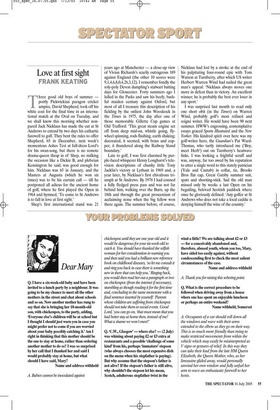SPECTATOR SPORT
Love at first sight
FRANK KEATING
Three good old boys of summer portly Pickwickian paragon cricket umpire, David Shepherd, took off his white coat for the final time in an international match at the Oval on Tuesday, and we shall know this morning whether nonpareil Jack Nicklaus has made the cut at St Andrews to extend by two days his cathartic farewell to golf. They bent the rules to offer Shepherd, 65 in December, next week’s momentous Ashes Test at full-dress Lord’s for his swan-song, but there is no remote drama-queen thesp in ol’ Shep, no milking the occasion like a Dickie B, and plebeian Kennington he said, was good enough for him. Nicklaus was 65 in January, and the Masters at Augusta (which he won six times) was to be his curtain call — till he postponed all adieus for the ancient home of golf, where he first played the Open in 1964 and hymned, ‘To come to St Andrews is to fall in love at first sight.’ Shep’s first international stand was 21 years ago at Manchester — a close-up view of Vivian Richards’s scarily outrageous 189 against England (the other 10 scores were 9,1,4,6,8,0,4,26,3,12). I remember fondly the roly-poly Devon dumpling’s stalwart batting days for Gloucester. Forty summers ago I lolled in the Parks and saw his beefy, bashful maiden century against Oxford, but most of all I treasure this description of his fielding by the onliest John Woodcock in the Times in 1975, the day after one of those memorable Gillette Cup games at Old Trafford: ‘This great steam engine set off from deep mid-on, whistle going, flywheel spinning, rods flashing, earth shaking; decorated, it seemed, with brass and copper, it thundered along the Railway Stand boundary.’ Late to golf, I was first charmed by purple-faced whisperer Henry Longhurst’s television descriptions of chunky little Tony Jacklin’s victory at Lytham in 1969 and, a year later, by Nicklaus’s first chivalrous triumph at St Andrews. By 1978 I had conned a fully fledged press pass and was not far behind him, walking over the Burn, up the 18th and through the great proscenium of acclaiming noise when the big fellow won there again. The summer before, of course, Nicklaus had lost by a stroke at the end of his palpitating four-round epic with Tom Watson at Turnberry, after which US writer Herbert Warren Wind had nailed the great man’s appeal: ‘Nicklaus always moves one more in defeat than in victory. An excellent winner; he is probably the best ever loser in any sport.’ I was surprised last month to read only one short obit (in the Times) on Warren Wind, probably golf’s most refined and soigné writer. He would have been 90 next summer. HWW’s engrossing, contemplative essays graced Sports Illustrated and the New Yorker. His kindred spirit over here was my golf-writer hero, the Guardian’s Pat WardThomas, who tartly introduced me (‘Boy, meet Herb’) out on Turnberry’s heatwave links. I was looking a frightful scruff and was, anyway, far too awed by his reputation to utter a single word to this stately patrician (Yale and Cantab) in collar, tie, Brooks Bros flat cap, Great Gatsby summer suit, spats and shooting-stick. Sad the old man missed only by weeks a last Open on his beguiling, beloved Scottish paddock where once he gloriously defined: ‘Any golfer at St Andrews who does not take a local caddie is denying himself the wine of the country.’


























































 Previous page
Previous page